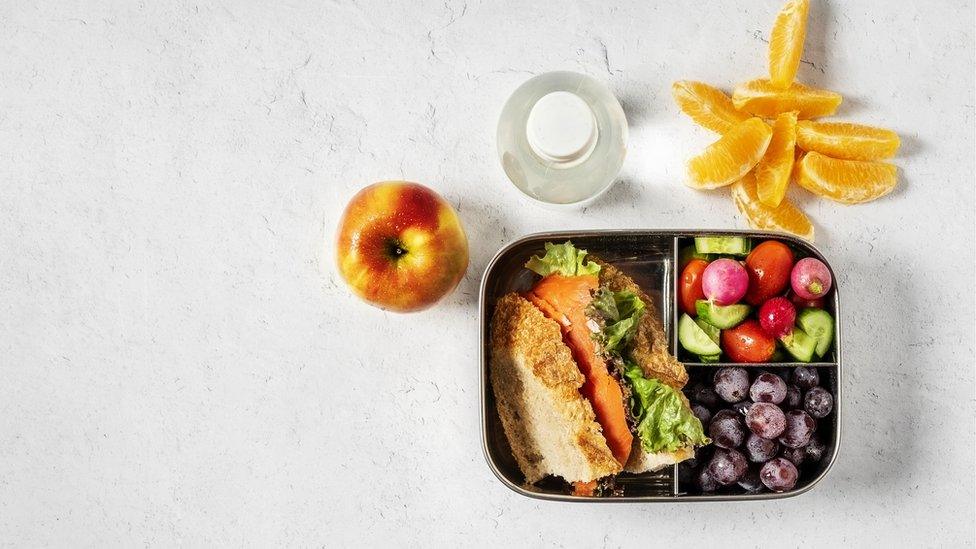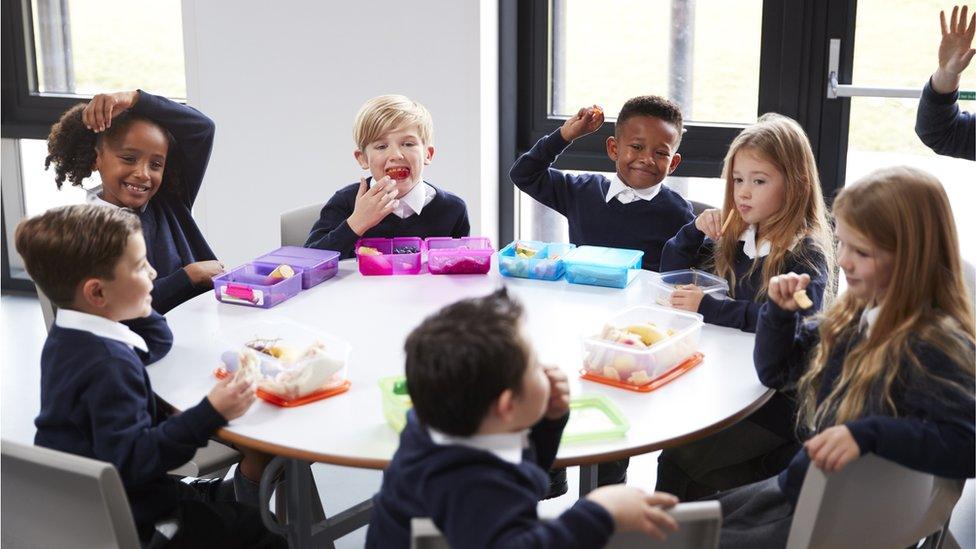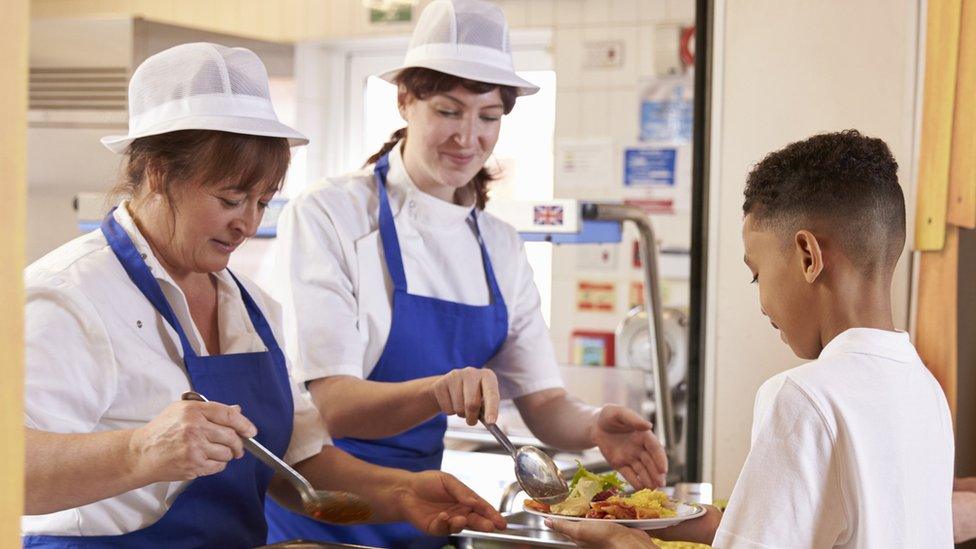Cost-of-living: We have schoolkids who don't eat between dinner and lunch
- Published

Teachers are in the business of educating.
Lesson plans, marking and looking out for development in their classrooms is their bread and butter.
But increasingly, staff are just as likely to be involved in literal bread and butter, by rolling out free meals to pupils caught in the crossfire of the cost-of-living crisis.
It's a path more and more schools have had to travel down as they increasingly see pupils without lunch money or coming to school on an empty stomach.
While about 30% of Northern Ireland pupils are entitled to free meals, many schools would like to see Stormont invest in breakfast for all pupils.
For Karen Mulholland, the principal of City of Armagh High School, there is a clear need.
The school will be providing free breakfasts for all pupils for the first time on Monday.
"We felt we wanted to help the school community in the current economic climate," she tells BBC Radio Ulster's Good Morning Ulster programme.
Inflation remains near a 40-year high, interest rates are at 3.5% - the highest level for 14 years - and energy bills have risen substantially.
City of Armagh High School has about 380 pupils and every pupil will be able to eat breakfast when they come to school.
'Vital for learning and development'
Why are schools reaching the point where they are being forced to do something?
There are a few reasons, Ms Mulholland said.
"We realised that we have children who do not have anything to eat from when they have their dinner until they have lunch the next day.
"Breakfast is vital for the learning and development of each child.
"We felt we could do it and we wanted to do it."
The funding does not come out of the school's budget but instead from businesses in the area.
The school began the process in September and is being supported by shops like Irwin's Bakery, Marks and Spencer, Lidl and Sainsbury's.
But - is it the responsibility of schools to do this or should we be looking to those in government?

As one Belfast headteacher Aine Leslie said, free meal provision is "not in the textbook for school leadership".
Nonetheless, it's something that her school, Hazelwood Integrated, has been doing for years.
In December, the school was into its third year of giving free school meals and is now starting to roll out a free breakfast for all students.
"November to March time is the most difficult for families, we have found," she said.
The free meals for all relies on external funding sources so the school cannot commit long-term.
However the free breakfasts are definitely here to stay.
Free meals were part of Covid recovery but the school soon realised they were needed beyond the pandemic.

"If you can prepare breakfast for a child for under £1 day there should be some long-term sustainable funding to do that," said Ms Leslie
The school has also been trying to help families in other ways with Christmas hampers and anonymous donations.
Families in need were identified by teachers and the school team.


We don't know exactly how many schools are doing free breakfasts and meals because there aren't official figures.
But, certainly anecdotally, there are many more schools doing it this winter than previous winters.
The Department of Education spends quite a lot of money on paying for free school meals for those who are eligible - that's about 100,000 pupils.
Schools can use a bit of money from the extended schools fund but, by and large, schools are funding this through their own initiatives.
The Belfast Charitable Society has given money to schools and they work with local supermarkets.
In Wales, the government has committed to offering every child in primary school a free lunch by 2024 - that's £200m of funding.
If there was any move to extend free meals, it would involve a lot of public money
There is no sign that kind of money is available here.

Call for more investment
"We believe that if you can prepare breakfast for a child for under £1 day there should be some long-term sustainable funding to do that," said Ms Leslie.
"Yes, free school meals for all pupils is a huge investment and I know the Department of Education are doing their very best.
"But we really would need to look at a more joined-up approach - maybe the Department of Health, Department of Education and Department for Communities," she added.
"It's not just about the Department of Education - this is a public health issue for us - children coming into school, being fed, ready for learning."
Power-sharing government at Stormont remains inactive and while departments are operating with civil servants, instead of ministers, at the helm, they face limitations on what decisions they can make and on how much money there is to pay for them.
However, Karen Mulholland agreed that more had to be done at a governmental level: "Everyone should have access to a breakfast."
She said there's a need for it and if the departments work together it could be funded "reasonably easily".
'Should be coming from central government'
Darren Mornin, headteacher at Limavady High School, also told Radio Foyle investment is needed from Stormont.
His school has been offering free breakfasts to all pupils in the school since October.
The school also provides a hot meal for pupils who choose to attend a homework club in the evenings.
Funding comes from the school budget and through donations from local businesses.
"Parents are very pleased that the school can offer this breakfast and give students a positive start to the school day.
"We can't continue to put finance into this type of programme when it should be coming from central government."
A spokesperson for the Department of Education said in the 2022/23 financial year it made £9.1m available to schools for the Extended Schools programme.
"The programme currently enables around 480 schools serving the most disadvantaged communities to provide a range of interventions and additional learning opportunities outside of the traditional school day.
"Many schools choose to offer breakfast and after-school clubs to pupils.
"Any decisions regarding extending the programme in future years must be taken in the context of available resources," they added.
The Department of Health said "poverty, nutrition and hunger are important factors that determine the health of the population" and would " welcome this being reflected in the next NI Programme for Government".
Related topics
- Published7 September 2022
